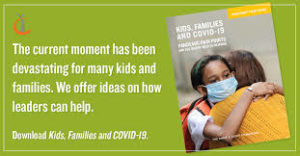COLUMBIA, SOUTH CAROLINA – South Carolina families with children struggle during the pandemic with health care, housing, mental health and food insecurity, according to Kids, Families and COVID-19: Pandemic Pain Points and the Urgent Need to Respond, a 50-state report of recent household data developed by the Annie E. Casey Foundation analyzing how families are faring during the COVID-19 crisis.
This KIDS COUNT® report examined data from weekly surveys conducted by the U.S. Census Bureau that demonstrate how families across the country are facing challenges to meet basic needs during this global public health crisis while managing school, work and health. The Foundation finds that the concurrent health and economic crises are exacerbating disparities in access to basic needs. Stark racial inequities across the nation in access to these needs continue to worsen. Thirty-one percent of African Americans, 26 percent of Latinos and 16 percent of Asians felt they were on the verge of failing to pay the rent or mortgage compared to their white counterparts. Food insecurity among African Americans and Latinos is nearly double (23% and 19%) that of their white counterparts (9%).
In South Carolina, 14 percent of adults living in households with children reported having low confidence they would make the next rent or mortgage payment on time. While the data is not available by race/ethnicity at this time, data experts agree that existing disparities in the state are likely being impacted as well.
Children’s Trust recently released its own statewide data snapshot on the impact of the pandemic on child and family well-being. That report highlights additional stressors for children and their families, including that more than 90,000 households with children in school do not have regular access to broadband internet43 percent report struggling with child care because of COVID, and health care access remains a concern with about 14% of South Carolina’s children living in home without access to insurance.
“Families are under greater stress and strain because of the pandemic, and these reports highlight specific areas where we can help,” Children’s Trust CEO Sue Williams said. “The recommended action steps show us what is necessary for children and their families to weather this unprecedented crisis. We urge policymakers and child advocates to put COVID-19 response at the top of their 2021 agendas.”
The Annie E. Casey Foundation calls on elected officials and other decision makers to:
- Put racial and ethnic equity first in policymaking by using disaggregated data and engaging community stakeholders. This should ensure that the policymaking process is informed by the diverse perspectives of those hardest hit by the crisis and created in partnership with communities. This approach should underpin any concrete policy actions.
- Prioritize the physical and mental health of all children by guaranteeing that any vaccine will be available at no cost by retaining and strengthening the Affordable Care Act. To promote mental health in this time of crisis, policymakers should work to reduce the student-to-counselor ratio in all school settings to levels recommended by mental health professionals.
- Help families with children achieve financial stability and bolster their well-being by expanding access to unemployment insurance for part-time and boost economy workers, low-wage workers and students and by expanding child care access. Additionally, policymakers should eliminate barriers to accessing Temporary Assistance for Needy Families (TANF), the Earned Income Tax Credit (EITC) and the Child Tax Credit (CTC). And beyond any temporary housing assistance programs aimed at heading off a foreclosure or eviction crisis, federal policymakers should expand the Section 8 Housing Choice Voucher program and increase the overall availability of public housing.
- Ensure schools are better funded, more equitably funded and ready to meet the needs of students disparately affected by the pandemic by boosting school funding to protect against the economic impact of the pandemic, build maintenance-of-equity requirements into relief packages, and address disparities in technology access at home and in the classroom.
Release Information
The 2020 KIDS COUNT report will be available December 14 at aecf.org. Journalists interested in creating maps, graphs and rankings in stories about the Kids Count report can use the KIDS COUNT Data Center at datacenter.kidscount.org.
About Children’s Trust of South Carolina
Children’s Trust is the only statewide organization focused on preventing child abuse and neglect in South Carolina. It leads and supports a network that shares our belief that all children should thrive, live in secure families and be surrounded by supportive communities. Children’s Trust coordinates the state’s efforts for the Strengthening Families Program; Triple P (Positive Parenting Program); S.C. Adverse Childhood Experiences Initiative; Maternal, Infant and Early Childhood Home Visiting; Child Abuse Prevention Month; and KIDS COUNT. For more information, visit scChildren.org.
About the Annie E. Casey Foundation
The Annie E. Casey Foundation creates a brighter future for the nation’s children by developing solutions to strengthen families, build paths to economic opportunity and transform struggling communities into safer and healthier places to live, work and grow. For more information, visit www.aecf.org. KIDS COUNT® is a registered trademark of the Annie E. Casey Foundation.






